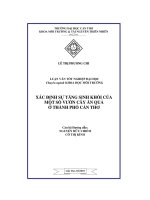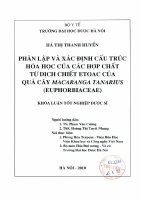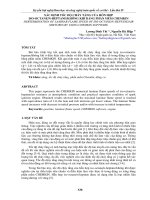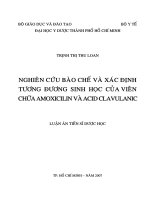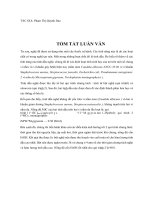Xác định hoạt tính sinh học của hỗn hợp tinh dầu vỏ quả chanh và cam
Bạn đang xem bản rút gọn của tài liệu. Xem và tải ngay bản đầy đủ của tài liệu tại đây (3.17 MB, 4 trang )
077-080
1,*,
2
1
2
-3-
-12-2016
T
(TDA)
(TDB)
trên hai
Staphylococcus aureus.
Escherichia
vòng tròn
là 39 ± 2,8 mm (tin
Staphylococcus aureus,
vòng tròn
.
) và
và Gram
43
1,5
3,5
Escherichia coli: 6,25
0,1- 0,2
,5)
Staphylococcus aureus: 3,35 l/ml.
0,8-1,6
)
Staphylococcus aureus và Escherichia coli.
45,56 ± 0,25%.
T
:
Abstract
The aim of this study was to evaluate the antimicrobial activity of oils against food-related bacteria gram
negtive Escherichia coli and gram positive Staphylococcus aureus by using lime, orange peel oils in
individual and in mixture. Both tested oils showed effective inhibition against Escherichia coli with inhibition
zones of 39 ± 2.8 mm (lime peel oil) and of 32
1.5 mm (orange peel oil). They also inhibited
Staphylococcus aureus with inhibition zones of 43 ± 3.5 mm (lime peel oil) and of 37 1.4 mm (orange peel
oil). The minimum inhibitory concentrations (MIC) of lime peel oil against both tested strains were 6.25 l/ml;
orange peel oil on a strains of Escherichia coli: 6.25 l / ml and Staphylococcus aureus: 3.35 l / ml. With
volume of lime peel oil used (0.1- 0.2
) and orange peel oil (0.8-1.6
) for maximum resonance
f Staphylococcus aureus and of Escherichia coli. The antioxidant
activity was determined by using DPPH and it was 45.56 ± 0.25%.
Keywords: Biological activity, Mixtures, Lime peel oil, Orange peel oil.
*
Staphylococcus aureus, Escherichia coli, Salmonella
typhy
Bacillus cereus
.
coli
Escherichia
Staphylococcus aureus
077-080
Citrus limonia
Citrus sinensis (L)
Staphylococcus aureus
Escherichia coli
TDA
TDA
TDA
TDA
TDB
2.2.
2.2.1.
o
2.2.2.
o
b
o
o
b
6
o
3.1. Kh
chanh và cam
n c a tinh d u v qu
077-080
Escherichia coli
Staphylococcus aureus
Escherichia coli
Staphylococcus aureus
Escherichia coli
Staphylococcus aureus
Staphylococcus aureus.
Tinh
d u
*
Escherichia coli
1MICTDB 1/2MICTDB 1/4MICTDB 1/8MICTDB
**(6,25 (3,13 l/ml) (1,6 l/ml) (0,8 l/ml)
l/ml)
N
c ch t i
thi u (MIC) ** ( l/ml)
(mm)
Staphylococcus
aureus
Escherichia
coli
Staphylococcus
aureus
1MICTDA
(0,8 l/ml)
2,51
1,54
1,34
1,16
TDA: Tinh d u v qu chanh, TDB: Tinh d u v qu cam
1/2MICTDA
(0,39 l/ml)
1,64
1,15
0,83
0,65
ng kính vịng trịn kháng khu n th hi n kh
ch vi khu n (
n).
1/4MICTDA
(0,2 l/ml)
1,46
0,92
0,64
0,58
1/8MICTDA
(0,1 l/ml)
1,15
0,71
0,45
0,36
c
**
N
c ch t i thi u là giá tr trung bình c a ít nh t
ba l n thí nghi m l p l i.
,
Escherichia coli
1MICTDB 1/2MICTDB 1/4MICTDB 1/8MICTDB
**(6,25 (3,13 l/ml) (1,6 l/ml) (0,8 l/ml)
l/ml)
1MICTDA
(6,25 l/ml)
2,30
1,50
1,35
1,15
1/2MICTDA
(3,13 l/ml)
1,60
1,10
0,85
0,68
1/4MICTDA
(1,6 l/ml)
1,35
1/8MICTDA
(0,8 l/ml)
1,15
0,85
0,80
tác,
.
.
(ml)
do DPPH
TDA
0,10
41,25 ± 0,12
TDB
0,10
38,17 ± 0,24
0,10
45,56 ± 0,25
0,10
43,38 ± 0,17
0,41
Vitamin E
0,65
và cam
0,41
0,35
3.3. K
077-080
ân Thanh, Samira Sarter.
) (2014) 417-422.
[4].
Escherichia coli
Staphylococcus aureus
Gutierrez J., Barry-Ryan C., and Bourke P. The
antimicrobial efficacy of plant essential oil
combinations and interactions with food ingredients.
International Journal of Food Microbiology, 124
(2008) 91-97.
[5]. Fei L., Liang H., Yuan Q. and Li C. In vitro
antimicrobial effects and mechanism of action of
selected plant essential oil combinations against four
food-related microorganisms. Food Research
International 44 (2011) 3057-3064.
Escherichia coli
Staphylococcus aureus
[6]. Molyneux P. The use of the stable free radical
diphenylpicryl-hydrazyl (DPPH) for estimating
antioxidant activity. Songklanakaric Journal of
Science Technology 26, (2004) 211- 219.
Staphylococcus aureus
Nguy
Hòa.
Escherichia coli.
i, Nguy n Th
nh
(2) (2013) 153- 162.
[2]. Nguy
Hòa.
[7]. Matook S.M and Fumio H. Evaluation of the
antioxidant activity of extracts from buntan (Citrus
grandis Osbeck) fruit tissues. Food Chemistry 94
(2006) 529-534.
i, Nguy n Th
(4) (2013) 519- 523.

